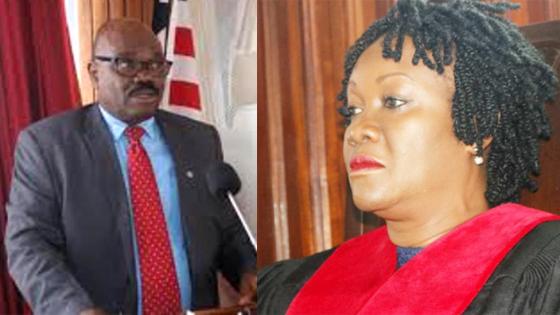Liberia: Chief Justice Yuoh, Judges Divided over Supreme Court's Bench Nomination

(L-r) President of the National Association of Trial Judges of Liberia, Judge Roosevelt Willie and Chief Justice Sie-A-Nyene Yuoh
— As Judges demand exclusive rights to Supreme Court Bench nominations
Controversy has arisen within the Liberian judiciary as judges express their desire to be considered for nomination to the Supreme Court Bench. This comes as President Joseph Boakai prepares to nominate a replacement for retired Associate Justice Joseph N. Nagbe.
With the President’s pending decision, judges are exploring every opportunity to have one of them occupy that position.
The National Association of Trial Judges of Liberia (NATJL) made their intentions clear when they, on Tuesday, February 13, attempted to involve Chief Justice Sie-A-Nyene Yuoh in their plans.
However, Justice Yuoh wasted no time to openly lash at the judges, terming their plans as circumventing the 1986 Constitution which gives the President of the Republic of Liberia the exclusive authority to nominate a Supreme Court justice.
During the opening of the February 2024 Term of the Criminal Courts A, B, C, D, and E, Justice Yuoh openly criticized the judges’ proposal, stating that it would contradict the provisions of the 1986 Constitution.
The Constitution grants the exclusive authority to the President to nominate justices, judges, and magistrates to the Supreme Court Bench.
The judges, through Roosevelt Willie, resident Judge of Criminal Court “A”, openly informed Justice Yuoh about a recent communication that contained a recommendation for the executive branch to only consider NATJL members for appointments to the Supreme Court Bench.
“In that communication, we said you should not only forward said recommendations but should make a passionate effort to ensure that the names recommended receive the appropriate appointments from the Executive Branch,”Willie told the Chief Justice.
While acknowledging that similar recommendations had been followed in the past, Willie expressed concern that the practice had since slowed down and unmotivated judges and magistrates.
He requested Justice Yuoh’s support in reviving this practice and establishing a committee to recognize and motivate outstanding judicial personnel.
"At some point in time, the bench slowed down on this process. We, therefore, pray for your indulgence to resuscitate this practice and as well establish a committee that will honor judges and magistrates and staff who will work with distinction, honesty, and integrity each year for the purpose of motivation.”
Justice Yuoh, however, stood firm in defense of the constitutional provisions. She emphasized that she would not take any action that would circumvent the constitutional authority granted to the President. She questioned the judges’ demand that the President’s choice for appointments to the Supreme Court Bench be limited to NATJL members, rather than considering qualified lawyers for the position.
“I will not do anything to circumvent the Constitution that gives exclusive authority to the President of Liberia to appoint justices, judges, and magistrates,” Yuoh emphasized. “For you to say I should make a recommendation to the Executive branch for appointment, I don’t understand what you are saying.
“This is why it is not good to open your mouth in the public going about saying things…," Justice Yuoh noted.
She also referenced her nomination to the Bench prior to serving as a judge, highlighting that judicial appointments have not always been limited to judges.
It is important to note that Justice Yuoh's commitment to upholding the Constitution has garnered support from some who believe that the judges' demands go against the principles of fair appointment processes and contravenes the Constitution.
.Article 54 of the Constitution provides amongst other things that: “The President shall nominate and, with the consent of the Senate, appoint and commission cabinet ministers, deputy and assistant cabinet ministers; ambassadors, ministers, consuls; and the Chief Justice and Associate Justice of the Supreme Court and judges of subordinate courts; superintendents, other county officials, and officials of other political sub-divisions; members of the military from the rank of lieutenant of its equivalent and above; and marshals, deputy marshals, and sheriffs.”
Legal stakeholders are, however, wondering now why should the judges who are interpreters of the Constitution are demanding that only they be nominated to the Supreme Court’s Bench.
